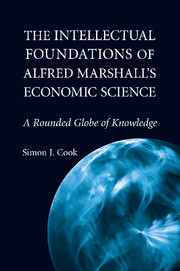Book contents
- Frontmatter
- Contents
- Acknowledgments
- List of Abbreviations
- Introduction
- PART I THE CONTEXTS OF MARSHALL'S INTELLECTUAL APPRENTICESHIP
- PART II DUALIST MORAL SCIENCE: 1867–1871
- PART III NEO-HEGELIAN POLITICAL ECONOMY: 1872–1873
- 6 A Philosophy of History
- 7 Missing Links: The Education of the Working Classes
- EPILOGUE: “A ROUNDED GLOBE OF KNOWLEDGE”
- Bibliography
- Index
- Titles in the series
7 - Missing Links: The Education of the Working Classes
Published online by Cambridge University Press: 25 October 2009
- Frontmatter
- Contents
- Acknowledgments
- List of Abbreviations
- Introduction
- PART I THE CONTEXTS OF MARSHALL'S INTELLECTUAL APPRENTICESHIP
- PART II DUALIST MORAL SCIENCE: 1867–1871
- PART III NEO-HEGELIAN POLITICAL ECONOMY: 1872–1873
- 6 A Philosophy of History
- 7 Missing Links: The Education of the Working Classes
- EPILOGUE: “A ROUNDED GLOBE OF KNOWLEDGE”
- Bibliography
- Index
- Titles in the series
Summary
INTRODUCTION
Mill's Principles of Political Economy was structured around a binary distinction between the doctrines of economic science and the moral applications of social philosophy. Yet as we have seen, in his 1876 essay on Mill's theory of value Marshall insisted on describing Mill's organization of the subject matter of political economy as a tripartite arrangement. As Marshall here presented the plan of Mill's Principles, the machinery of exchange stood side by side with the “natural laws” of production, on the one hand, and the particular “social arrangements” that determined the mode of distribution, on the other. For Mill, the machinery of exchange constituted a merely instrumental (i.e., noncausal) portion of political economy. For Marshall, this machinery was identified as “the proper province of ‘pure’ or ‘abstract’ economic investigations,” and the tendency toward equilibrium of supply and demand was held up as the “central truth” of political economy. In the same essay, Marshall observed in passing that experience had shown that “in some details” Mill's tripartite arrangement was “not wholly successful.” In this chapter both the raising of the epistemic status of the theory of value and the criticism of Mill's arrangement of the subject matter of political economy will be related to Marshall's early encounter with Hegel.
If the various parts of this chapter do not form a rounded whole, this is because the chapter is concerned with the developments in Marshall's economic thinking that occurred in the immediate wake of his historical studies around 1873. At this time Marshall had not yet integrated the different social and economic lessons that he had learned from his study of Hegel.
- Type
- Chapter
- Information
- The Intellectual Foundations of Alfred Marshall's Economic ScienceA Rounded Globe of Knowledge, pp. 227 - 262Publisher: Cambridge University PressPrint publication year: 2009

